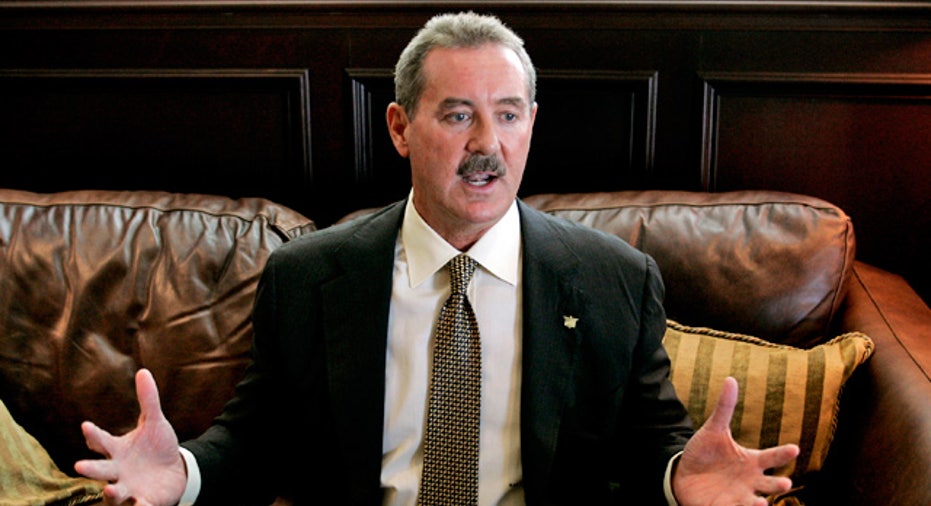Stanford Has Been Cheated By Madoff

Allen Stanford, who was finally convicted for his $7 billion fraud Tuesday, was a far more colorful Ponzi scheme perpetrator than Bernie Madoff, yet somehow Madoff gets all the love.
One of the greatest actors of our time, Robert De Niro, is slated to play Madoff in a movie based on a best-selling book. Who is going to play Stanford? So far, nobody. Not even Gary Busey. You read about "mini-Madoffs" all the time. You never read about "mini-Stanfords."
Madoff stole the title of the fraud itself from the late Charlie Ponzi, the 1920s pioneer who had been the nameplate of this easy-to-play con game for nearly a century.
Nobody ever used the term "mini-Ponzi." They didn't want to discourage investigators by suggesting a financial scheme was too small to prosecute. But mini-Madoff? People say this all day long without any notion they could be denigrating a respectably sized scandal. You know, $25 million here, $50 million there. It seems like there's been a mini-Madoff in almost every county.
Stanford frequently has been called a mini-Madoff since his arrest in 2009. He defrauded more than 30,000 investors in 113 countries. He stole more than $7 billion. Yet thanks to Madoff, he cannot secure a more-memorable place in history.
Madoff stole more than $17 billion (and early on, investigators grossly overestimated Madoff's fraud at $65 billion). So Stanford is going down in the books as a runner-up, a mini-Madoff.
This is like saying he's a punk compared to a man who has described himself in media interviews as "this little Jewish guy from Brooklyn." The last thing any big, proud Texan needs to be called when facing 230 years in prison is a punk.
Stanford may be second to Madoff in dollar volume, but he is no punk.
At one point, Stanford was said to have a personal net worth of more than $2 billion. Madoff, by contrast, was said to be worth only about $800 million, if that.
Stanford used his ill-gotten gains to create an international cricket league and name sporting venues named after himself. Madoff, who managed money for owners of the Mets, just had a few seats at the game. And it was not even the Yankees game.
Stanford also used his loot to take over the Caribbean island nation of Antigua and Barbuda, where he was officially knighted in 2006. Until he was finally stripped of his knighthood, people had to call him "Sir Allen."
Like Stanford, Madoff bought yachts and planes, but he leased space at marinas and airports. Never in his wildest schemes did he imagine taking over entire islands for his personal fleet, or becoming "Sir Bernie." And think about it: In today's imaginative media culture, how can any super-villain be considered truly evil without his own island lair?
Until he came undone, Madoff rarely did media interviews. Outside of his victim pool, few people had heard Madoff's name.
Stanford, however, owned two newspapers in Antigua. And he was named "2008 Man of the Year" by London-based World Finance magazine. The magazine decided to forge ahead with this honor, dismissing the mounting allegations against Stanford as unproven rumors. When did Madoff garner this kind of editorial deference?
Stanford convinced his investors that their money was in CDs--as safe as any federally insured bank account in the U.S. Madoff's deception was never this bold. He told his investors investing was risky, and that he didn't really want to manage their money. What kind of lie was that?
Like any die-hard criminal, Stanford fought his prosecution for years, even when he was down to court-appointed attorneys. But Madoff turned himself in, even when his till had millions of dollars left. What kind of Ponzi schemer calls it quits when there is still plenty of loot left to hire real lawyers?
Stanford had regulators working for him, including Dallas attorney Spencer Barasch, the former head of the Securities and Exchange Commission's Fort Worth regional office, and Bernerd Young, who spent decades working for the National Association of Securities Dealers, which is now known as the Financial Industry Regulatory Authority.
The closest Madoff ever got to this amazing level of regulatory capture was when his lovely niece, Shana, married SEC attorney Eric Swanson. For Madoff, it was just one of those flukes of love. Not a truly sinister plan, like Stanford's.
In the end, Stanford is the name of a prestigious institution of higher learning, while Madoff sounds like a dollar-store laundry detergent. Yet 20 years from now, few will remember Stanford, and those who do probably will call him a mini-Madoff.
(Al's Emporium, written by Dow Jones Newswires columnist Al Lewis, offers commentary and analysis on a wide range of business subjects through an unconventional perspective. Contact Al at al.lewis@dowjones.com or tellittoal.com)



















